Confidence is much like the wind. It wields immense power and can sweep you away at a moment’s notice, yet it can fall flat in an instant. Its speed and ferocity change day by day and can alter the way you live your life in small and dramatic ways.
For instance, one day you may feel flat, only for a wave of confidence to wash through and propel you forward into a previously unanticipated state of being. Then there’s the gentle breeze – a stable confidence that continually nudges you in the right direction.
Much like the wind, confidence can dissipate at a moment’s notice. And much like Mother Nature, acquiring and sustaining confidence is more complicated than it looks. Most of the problem resides in missing the confidence-damaging habits lodged into our lives unbeknownst to us. Cutting them out is the best and most instant step you can take in the pursuit of self-confidence. While it may be difficult – a habit is called as such for a reason – knowing what to avoid is somewhat easier than building a new habit from scratch.
With that in mind, here are a few habits to avoid to help supercharge your confidence and take your life to the next level.
Eliminating these sneaky habits can supercharge your confidence. For more on building empowering habits, check out our Habits and Behavior Guide.
Comparing yourself to others
Comparing yourself to other people is perhaps one of the slippiest slopes to fall down. It can happen to anyone, and while you’ll usually compare your life against people you know such as friends and family, you can judge parts of yourself against certain characteristics of others. At university, for example, you may interact with a classmate who appears to have a more comprehensive understanding of the given text and begin to examine your academic deficiencies against theirs. It happens. What matters is how you respond to the moment and change how you approach matters in the future.
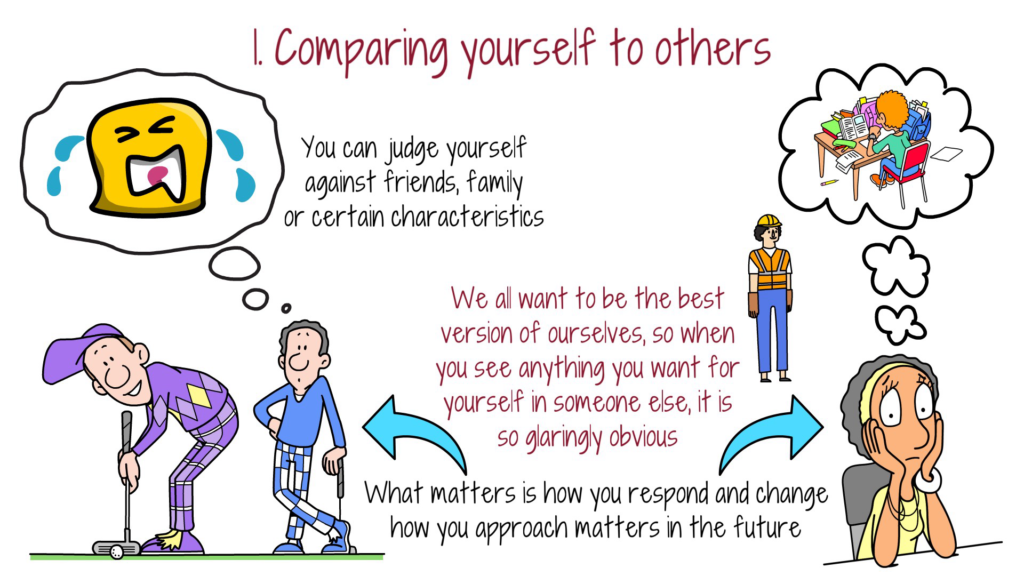
It’s the comparison itself that does the damage. We all want to be the best version of ourselves possible, so when you see anything you want for yourself in someone else, it is so glaringly obvious it might as well be wearing a high-visibility jacket.
Too much of this ushers in feelings of jealousy, frustration, and hopelessness. Mind you, simply being aware you compare yourself to others is not enough these days. Social media consistently reminds us of what we lack and provides potential solutions right at our fingertips. This can be overwhelming for many.
Above all, it’s best to remember that whoever you’re comparing yourself with, whether it’s your best friend or the new guy at work, has their own journey and story. The very thing you’re comparing yourself to might be a point of insecurity for them and, who knows, they may even be jealous of you. The point is, it’s best to not get bogged down in someone else’s life. It can hurt your feelings and is not an effective way of seeing what you need to fix in your life.
Dwelling on mistakes
The human memory system is a wondrous yet frustrating entity. One day you forget your deadline, the next you’re shown a situation from 4 years ago where you wish you’d reacted differently. Before you know it, a cringe-filled wince spreads across your face and you’re painfully reminiscing on what you did wrong. Situations where you wish you’d not missed something a partner said or wish you’d made yourself heard at work.
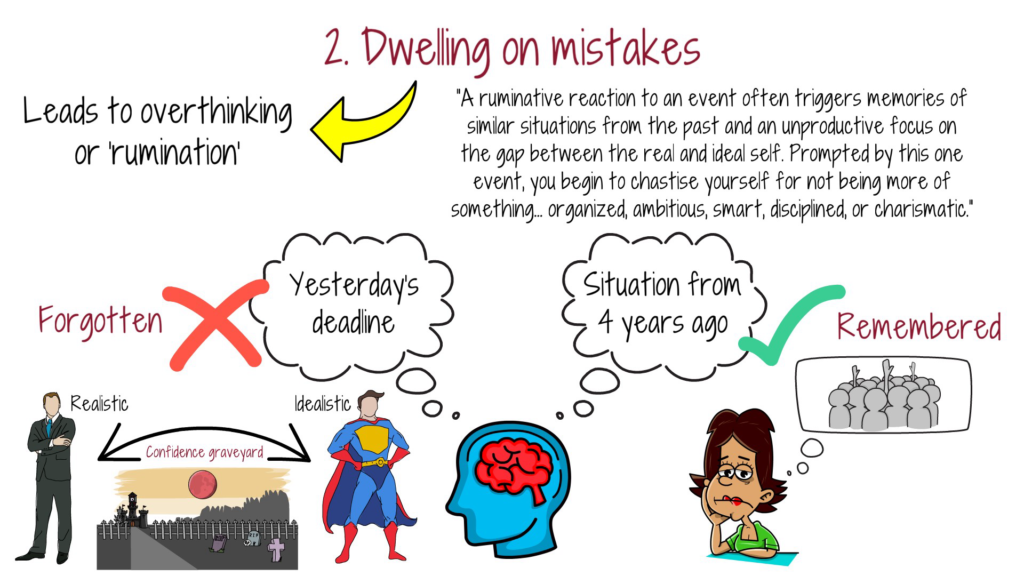
Dwelling on such mistakes often leads to overthinking, something the Harvard Business Review calls ‘rumination.’ In their words:
“A ruminative reaction to an event often triggers memories of similar situations from the past and an unproductive focus on the gap between the real and ideal self. Prompted by this one event, you begin to chastise yourself for not being more of something… organized, ambitious, smart, disciplined, or charismatic.”
In other words, when you ruminate, you begin critiquing yourself, creating an unfair comparison between your realistic, actual self and your idealistic, hypothetical self. The division within is a graveyard for confidence. Nitpicking situations you can do nothing about makes it challenging to perceive your good moments – the ones that build your confidence up – at all, as the negative ones are constantly ruminating in your head.
Overthinking is a sneaky habit that fuels self-doubt and erodes confidence. Learn how to break free in our guide on self-doubt and overthinking.
Worrying about things you can’t control
We all want to feel as in control of our lives as possible. We choose the food we eat, clothes we wear, people we see, and if possible, the career we choose. There’s choice on a micro-scale too. We choose our individual processes for everything – how we have our toast, the driving style we use, and our morning routines, for example. Controlling feels empowering. It is. It gives you leverage over the external world and instills an intrinsic belief that the more we control, the more we understand. Understanding breeds confidence. It does, however, work both ways.
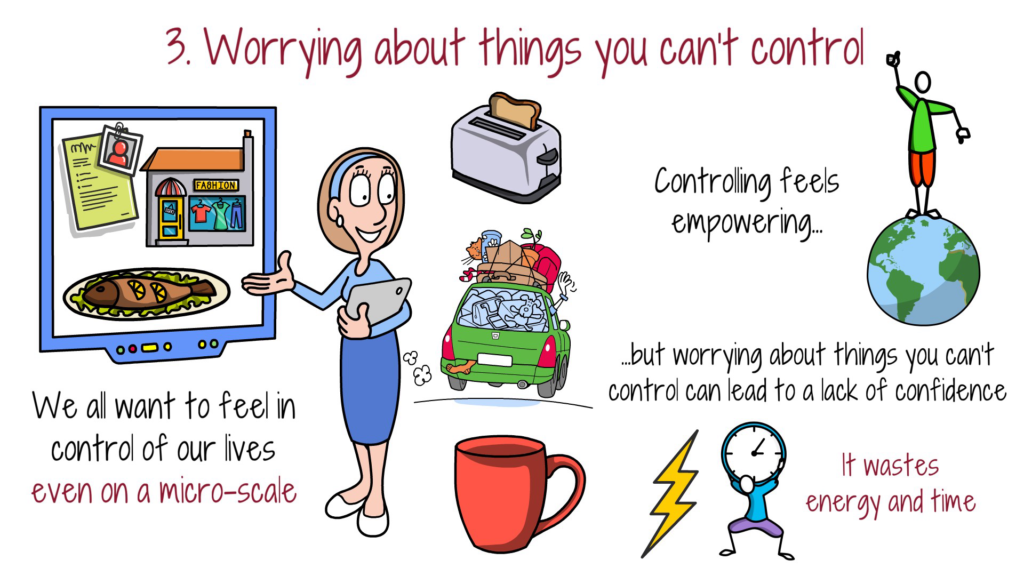
Worrying about things you can’t control is a surefire path to a lack of confidence. You’re essentially wasting energy on a train of thought that’s impossible to catch, waiting for a slither of confidence-boosting control you won’t get. It’s energy-consuming. Only worrying about what you can control will free up time and conserve the all-important energy needed for a confidence-laden existence.
Perfectionism
Let’s say you’re writing an important email. You spend time meticulously crafting each word, formulating the best sentences, and ensuring no stone is left unturned. But there’s something wrong. The magnitude of the email hangs over your head – you know there’s no margin for error so instead of accepting you’ve done your best (which is probably enough), you tinker over and over again. That is perfectionism: the inability to accept finality and move on in fear of imperfection.
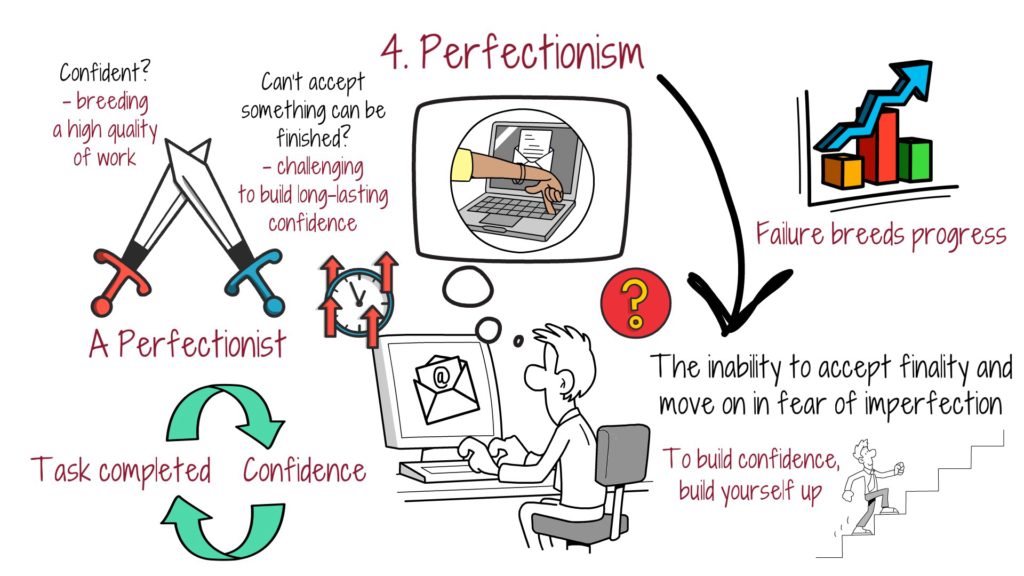
You’d think someone known to strive for perfection above all else would be a confident person – they only accept the best and nothing else. While such an attitude breeds a high quality of work, it’s also a double-edged sword. If you can’t accept that something can be finished – that ‘perfection’ might never be reached – then it’s challenging to build any kind of long-lasting confidence.
Confidence is built on the back of tasks you’ve completed. More often than not, it’s the unsuccessful attempts you learn from the quickest. Failure breeds progress. Regardless, you can’t build up a daily catalogue of completed tasks if you’re unable to move on because of perfectionism.
To build confidence, you need to build yourself up. Accept that your best is as perfect as it can be.
Improper maintenance of your goals
Goals are universal. We all have them and they come in all shapes and sizes, from eating your 5 a day to moving into a new house. You name it, someone probably wants it. It’s all well and good having goals, but without proper maintenance, they can prove debilitating for building self-confidence.
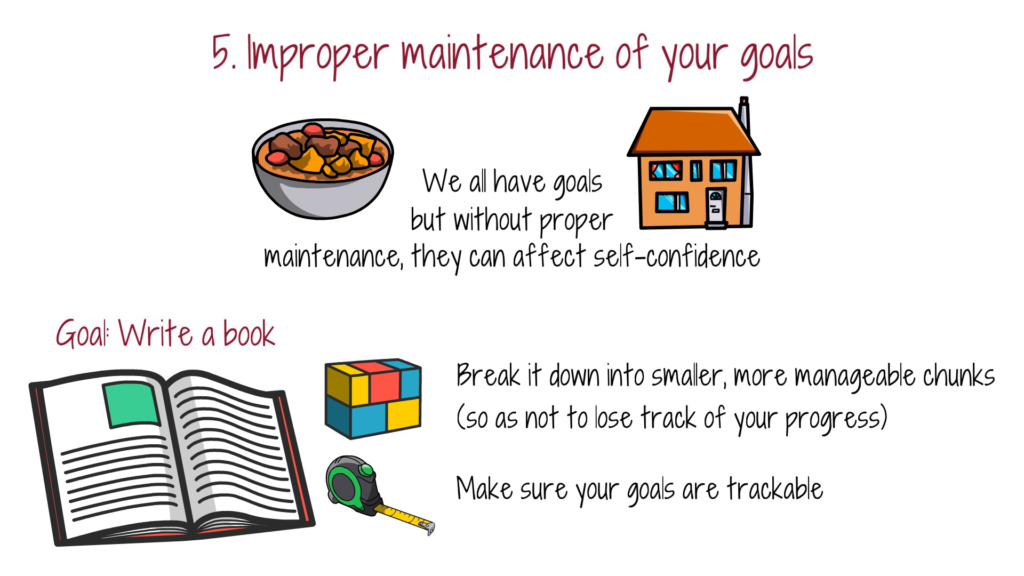
Let’s say your big goal is to write a book. You don’t break it down into smaller, more manageable chunks so there is no way of knowing if you’re on the right trajectory. You then get lost in the seemingly never-ending amount of work left and lose track of your progress. In this scenario and all others like it, a lack of maintenance leads to dissociation from the goal at hand.
It’s important to make sure your goals are trackable. In pursuit of your goals, completing smaller checkpoints provides a sense of accomplishment that allows you to supercharge your confidence.
Conclusion
Of course, it can be difficult to identify these habits (if you possess them), let alone cut them out and avoid them altogether. More to the point – you won’t magically turn yourself into the most confident person in the world as a result.
Confidence can come and go, but the key is to find a way to make it sustainable – to pick yourself up with the assurance that you can – and will – go again. That happens when you know which habits to avoid. By removing yourself from situations and environments that potentially damage your confidence, you’re giving yourself the best possible platform to build and supercharge your confidence.
Remember, it can be fickle. Accomplishments will come and go, but what you avoid is firmly within your grasp.
All you need to know is where to look.
